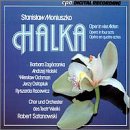| All Artists: Stanislaw Moniuszko, Robert Satanowski, Polish National Opera Orchestra & Chorus, Andrzej Hiolski, Barbara Zagorzanka, Jerzy Ostapiuk, Ryszarda Racewicz, Wieslaw Ochman Title: Stanislaw Moniuszko: Halka Members Wishing: 0 Total Copies: 0 Label: Cpo Records Release Date: 1/18/1995 Album Type: Box set Genre: Classical Style: Opera & Classical Vocal Number of Discs: 2 SwapaCD Credits: 2 UPC: 761203903221 |
Search - Stanislaw Moniuszko, Robert Satanowski, Polish National Opera Orchestra & Chorus :: Stanislaw Moniuszko: Halka
 | Stanislaw Moniuszko, Robert Satanowski, Polish National Opera Orchestra & Chorus Stanislaw Moniuszko: Halka Genre: Classical
|
Larger Image |
CD Details |
CD ReviewsUnfairly neglected believable slavonic opera Mr JB | Karlskrona Sweden | 02/22/2001 (4 out of 5 stars) "I think this a great showcase for the so often neglected slavonic opera, strangely so, since Dvorak, Tchaikovsky, Bartok, Chopin, Smetana and so many other of the most celebrated composers of non-vocal classical music comes from these parts of Europe. Probably, this comes from the fact that slavonic languages are in no way related with the languages of 'the west world'. This neglecting view is shown, as commented by a reviewer below, also by the record company when not giving us the polish text alongside the other, more common, languages. This does not, however, disturb me too much since it's rather easy, even without any knowledge of the polish language, to follow the text in a language you know, helped by the index numbers of each track (there are several). And, and this is a strong point indeed, Stanislaw Moniuszko has in this opera also managed what few other opera composers of the romantic era (it's in the transition of romantic / Verdi era) actually did - to make a psychologically believable unity of text and singing - the music perfectly sounds as the text implies (even Verdi would be proud of the psycological structure of the caracters). Just listen to either of Jontek's great arias in act 2 and 4 respectivly - love, pain and bitterness. This also goes for Janusz, who is not onesidedly cold & mean, but also shows guilt at times. As a luxury we in 'Halka' also have a few instrumental pieces that are highly memorable, maybe most widely known the 'mazurka'. This almost totally makes you forget that the music sometimes, falls down to conventional standards - the reasons to love this opera are simply too many to dismiss it by such a simple fact - to be honest, have you ever heard an opera performance that doesn't at times sound conventional?! The performance heard here is very good - showing every aspect of the score (love, despair, bitterness, oppression, pain, etc). None of the main roles really sounding as young (vibrato sometimes is wide in higher registers) as they are in the plot - but that's a minor problem since they all know how to present this opera (they've done it before!), and boy, do they deliver here - this is a great showcase for good live recordings without too many disturbing noices. I'm sure - if 'Halka' had been written by an italian or in italian - it would be appreciated as one of the strongest operas of the 19th century. Don't hesitate - this is really, really good." Live recording, no texts Gustavo Demarco | 01/04/1999 (1 out of 5 stars) "Moniuszko is revered in Poland as father of vernacular opera, and second only to Chopin among 19th Century Polish composers, and Halka is his masterpiece. The opera is based on a poem by Moniuszko's contemporary Wlodzimierz Wolski. In this Halka is a peasant girl pregnant by and in love with Janusz, her lord, who has discarded her, and continues to reject her until she is driven to drown herself. In doing so she spurns Jontek a fellow serf. The sub-text of the libretto however is full with political and national undertones. So a recording like this should be a treat for anyone interested in slavic opera. But sadly it is not to be. Instead we have another case of a normally exemplary record company giving second class treatment to anything with slav lyrics.The first sign of trouble is the mysterious square of brown cardboard filling the gap between CD box, libretto and slighty-too-large sleeve. When you open the slim libretto you know why. CPO perhaps initially planned a full libretto but seem to have decided to include only translations in English, German, and French and skip Wolski's Polish text. (Can you imagine a record company doing this with an Italian libretto?)It stands to reason that anyone buying a Polish opera, particularly one as nationally famous as Halka, has some interest in things Polish. As it stands your Polish will need to be pretty good and your ears sharp to pick out the lyrics in the chorus sections, not that the Polish National Opera do a bad job, but the acoustics of a live recording (1986) don't help. As for the soloists they are the recordings redeeming feature. Like Moniuszko and Wloski themselves (28 and 23 respectively in 1847) the roles of Halka, Jontek, and even Janusz are twenty-somethings so in some ways tt seems counter to the spirit of Moniuszko's age to have these sung by stalwarts of the Teatr Wielki in their 50s and 60s, respected as they may be. On the other hand it would probably be difficult to find five individuals anywhere more expert in this repertoire and Barbara Zagorzanka gives a light enough touch to Halka's arias.Playing time 65'21 + 56'20" Not the version of first choice Gustavo Demarco | 08/14/2000 (1 out of 5 stars) "For reference there is another recording of Halka also featuring Wieslaw Ochman as Jontek but with Stefania Woytowicz in the title role. Conducted in 1973 by Jerzy Semkow it was reissued in 1988 on Le Chant du Monde (LDC278 889/90) and includes notes, Polish libretto and translations."
|

 Track Listings (11) - Disc #1
Track Listings (11) - Disc #1